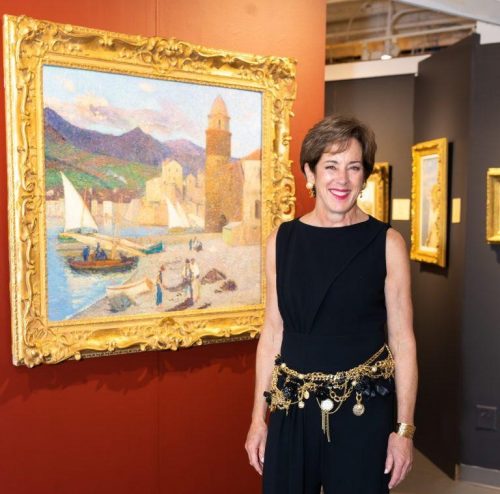
BY JUDY CARMACK BROSS
Editor’s Note: We present Part II of our profile of several Chicago area non-profits strategically facing into the daunting challenge of helping those they serve during this pandemic.

Charenton Drake. Photo by Widia Viti Photography and Robin Subar Photography.
On May 14, the Woman’s Board of Northwestern Memorial Hospital was to welcome hundreds of guests to the now-postponed opening night party of the Chicago Antiques + Art + Design Show at the Merchandise Mart. The over-a-century-old board pivoted immediately to helping the hospital take care of its patients at this critical time.

Co-chairs of 2019’s opening night party Stuart Dyer, Alison-McNally, and Elizabeth Pruett. Photo by Widia Viti Photography and Robin Subar Photography.
Woman’s Board President Charenton Drake shared the news of the board’s donation of $350,000 to Northwestern Memorial Hospital’s Memorial Hospital’s COVID-19 Relief Fund. It is the largest donation to this fund that the hospital has received to date. It reminded long-term board members that in the 1990s, the Woman’s Board donated over $700,000 to fund the Women’s HIV Clinic at Northwestern, the largest donation given by a board anywhere to this fight.
Introduced to this need by Dr. Rob Murphy, the board has continued to support the clinic begun by Dr. Pat Garcia, Professor of Obstetrics and Gynecology: “As President of The Woman’s Board of Northwestern Memorial Hospital, I have been on my computer and cell phone more in the past four weeks than I ever imagined for this volunteer position, at least 9 hours a day I would estimate, and it is a privilege. I feel our board is full of talent and resources that can and do make a difference in the Chicago community now as we have in our past 123 years.”
She continued, “We are more than a fundraising board—we are makers of history. We do the unusual. We do the unexpected. We are own 5013C that controls the destiny of the funds we raise. We have used them to buy vans to bring those without transportation to the hospital for care. In 1994, we were the first to support the HIV Clinic despite the negative connotations surrounding the illness. We choose which hospital research projects we want to fund. We have always been dedicated to the compassionate care of patients as well as the education of their families about their loved one’s health challenges. We are truly unique in the world of volunteerism.”
She shares that the current challenge, COVID-19, has required the board to be more creative and flexible, using virtual communication to exchange ideas and to get people involved. She notes that these online meetings avoid not only the normal headaches of meeting in person—traffic and the unreliability of public transportation—but the lower cost means more money for the cause. It also means that those who have young children and may not be able to make it, contending with nap or school schedules, have more flexibility when it comes to virtual gatherings. “I feel that virtual communication has really empowered volunteer groups. I see a much wider age range of volunteers and larger geographic areas coming together through virtual communication. This could be a whole new world for volunteers, donors, and those in need,” Drake adds.
The Woman’s Board also joined with one of its members, Elizabeth Blodgett, who works for Horizon Therapeutics, to put together a moving visual thank-you to the health care providers at Northwestern Memorial Hospital.
“My Horizon colleague Meghanne Downes is part of a group creating a family resource site for Horizon employees and came up with the idea for an artwork drive to honor doctors, nurses, and other medical staff working on the front lines. Familiar with my role and responsibilities on the Woman’s Board at Northwestern Memorial Hospital, she called me and said, ‘I think we can do this.’ That is what got the ball rolling. I contacted the Woman’s Board and we got to work putting together a collaboration of gratitude for these brave healthcare providers.”
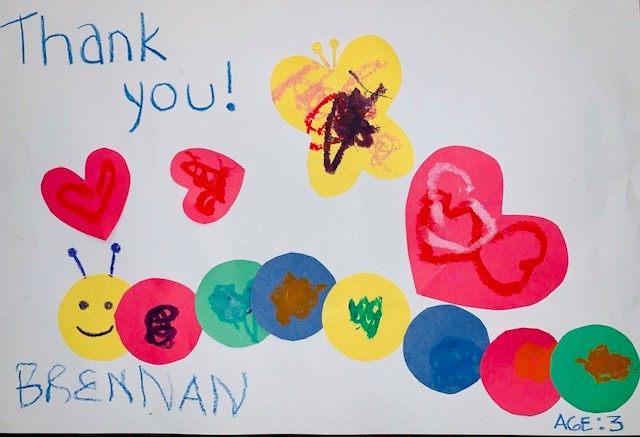
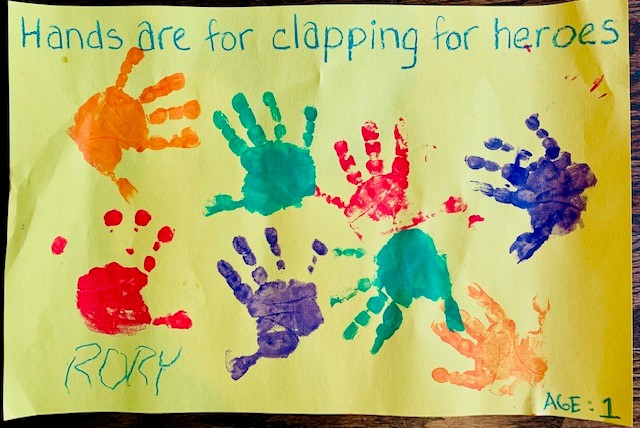
The children and grandchildren of Horizon employees, along with other companies who joined the effort later, created handmade cards that were sent digitally to the hospital and are now being displayed on digiboards throughout the Northwestern Medicine network. “Our hope is to provide encouragement and thanks to those who are working tirelessly to keep us healthy and safe. I couldn’t be prouder to be a part of both the Woman’s Board and Horizon Therapeutics – two wonderful organizations focused on providing support and compassion during this critical time,” Blodgett says.
Horizon is focused on researching, developing, and commercializing medicines that address critical needs for people impacted by rare and rheumatic diseases. Their pipeline is purposeful: applying scientific expertise and courage to bring clinically meaningful therapies to patients. They believe science and compassion must work together to transform lives. In addition to their website, Horizon is active on Twitter, LinkedIn, Instagram, and Facebook, as a means to share their extraordinary efforts.
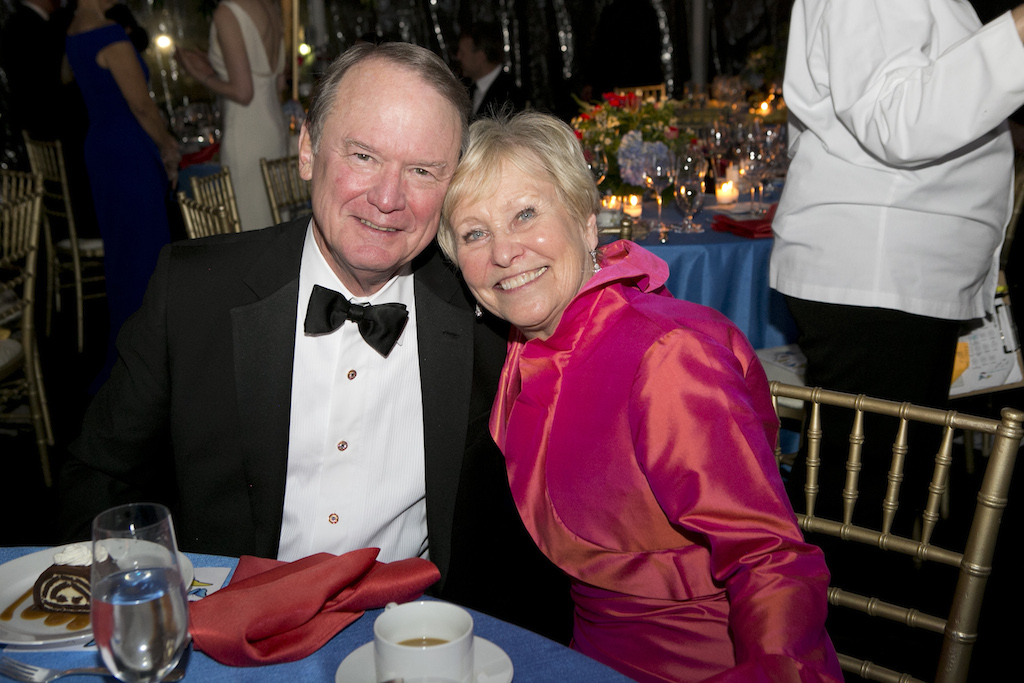
Dick and Peggy Notebaert.
Known as the first museum of the West when it was founded in 1857, the Chicago Academy of Sciences was the result of a brainstorm between nature aficionados and amateur scientists seeking a space where they could study and share the specimens they collected. It became Chicago’s first public museum when it opened its doors in 1869. Destroyed by the Great Chicago Fire, it was rebuilt in Lincoln Park in 1894, with a new wing, the Peggy Notebaert Museum, built nearby. Known for its iconic Judy Istock Butterfly Haven, the museum provides more hands-on science and nature instruction than any other of its kind in Chicago.
For the past 21 spring-times, the Butterfly Ball has raised a total of $35 million for the museum. Knowing that the 22nd Annual Butterfly Ball was forced to cancel, we turned to Marc Miller, the museum’s vice president and chief development and marketing officer, to learn how they were meeting the challenges of this current world climate.

Marc Miller and Nature Museum CEO Deborah Lahey at a past Butterfly Ball.
The gala is always the first Friday in May, so in keeping with tradition, the date has been set for May 7, 2021, with 750 guests anticipated to fill the impressive tent on the museum’s north lawn. Susan Whiting was to receive the fourth annual Butterfly Award for exemplary leadership to the institution. Loyola University and its Institute of Environmental Sustainability would have been given the museum’s seventh annual Leadership in Science and Education Award. Miller assure they will find a way to recognize their leadership at an event this fall.

Susan Whiting.
“Following the Museum’s closing on March 13th, with limited staff taking care of the animals in the museum, the educational staff have been working from home on how to supplement home schooling. Our content varies each day in terms of storylines and videos, right now we have an excellent one up about beetles,” Miller shares.
Education is the museum’s largest department, delivering more scientific and nature-related support to teachers in CPS and the Archdiocese than any other institution. “Through it all, one thing is unquestionably clear to me: we need science. If this crisis has already taught us anything, it’s that our collective fate lies in a better understanding and appreciation for nature and science, in the hands of capable doctors and researchers, and in a stronger respect for knowledge, expertise, and information,” says Miller.
“And these are the fundamental building blocks we lay every day for Chicago’s students. Everything about the Nature Museum is intended to ignite the sparks of curiosity, wonder, and ingenuity in science for students, sparks that will illuminate answers to our most complex challenges,” he adds. “So that is why we continue to reach out seeking support for this vital work at the Nature Museum through gifts to the Butterfly Ball, even though we can’t all be together at the museum this May 1st for the wonderful evening celebration!”
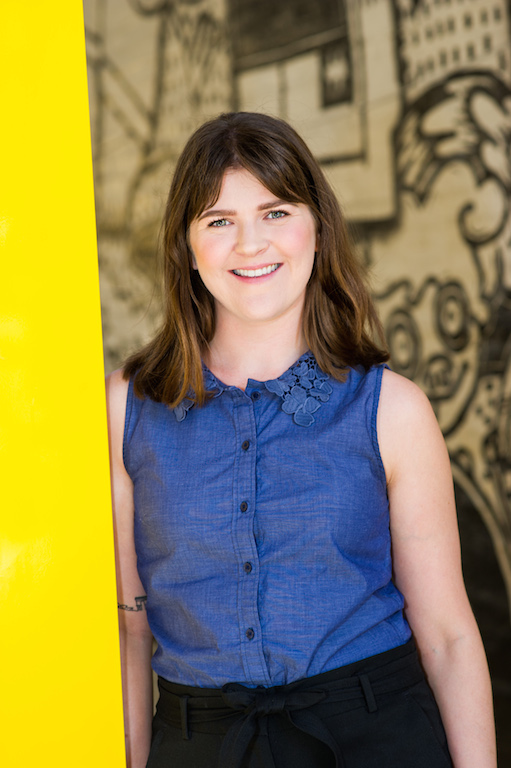
Nicole McLellan by Angela Garbot Photography.
We turned to representatives of Chicago’s vibrant theater community to tell us how they are finding ways to raise the curtains visually. Nicole McLellan of the Lakeview Chamber of Commerce and Courtney Smith of the Lakeview East Chamber of Commerce told us about Chicago’s largest theater district: “The Belmont Theater District is home to more than 50 theaters with hundreds of shops and restaurants within a short walking distance. Following impacts of COVID-19, we have been actively working with our members and the Lakeview East and Lakeview Chambers of Commerce to promote that there are still ways to find entertainment and celebrate the arts: digitally! Many, too many, shows had to be cancelled or postponed, and we’re working with our members to help promote the different and creative ways they are keeping Chicago virtually entertained while our theaters are physically closed.”

With an immediate impact being felt by theaters—one that will likely be felt for years to come—many theaters have turned to virtual fundraising campaigns, seeing an outpouring of generosity from patrons, as well as from individuals who may not be regular theatergoers but just want to help.
When asked what they thought was the most creative response that engaged staff, actors, and audience members have had, they shared that the Annoyance Theatre arranged a 10-day lock-in where some of the staff quarantined together and lived in the theater for 10 straight days. During the lock-in, they wrote, produced, and live-streamed an original show called Out of Touch. A recorded version is now available on their website.
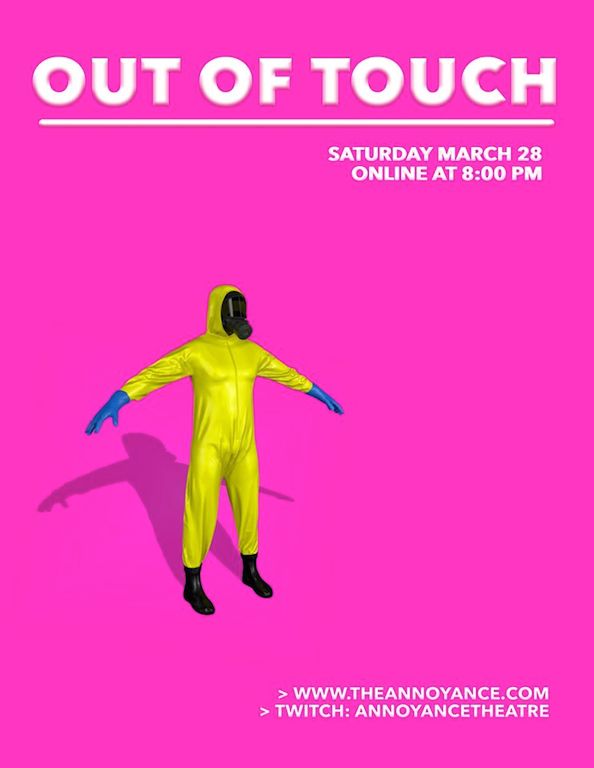
“This is a time when the performing arts are given an opportunity to really shine. Instead of binging Netflix or Hulu, we suggest checking out the diverse selection of online programming the BTD has to offer at BTDChicago.com. There truly is something for everyone, from live standup comedy, to filmed performances that have been edited for superb home-viewing, and even virtual improv classes and workshops for children,” they share.
The Belmont Theater District truly is one of the most original and authentic channels currently showcasing Chicago’s exceptional talent. “We are calling on patrons to support the arts now and, if they are able, to donate or buy subscriptions or gift certificates to help them sustain cash flow. It is important to realize this is about more than just the shows and their performers—there are countless behind-the-scenes staff members who are also directly impacted. In addition, many in the theater community rely on the hospitality, service, and restaurant industries for a large portion of their income, and those industries are also being hit hard by the health crisis. Even just a few dollars donated to an organization may very well be the additional revenue that allows them to reopen their doors when this is over,” they explain.
In Parts III and IV, we will present updates from Facets, the Junior League of Chicago, The Juvenile Protective Association, the Red Clay Dance Company, the Athenaeum Theatre, Humble Design Chicago, and others.



